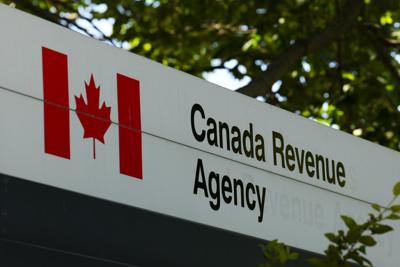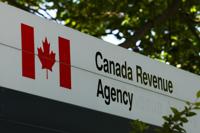A TikTok account posted a video in July claiming retailers and financial institutions would report purchases over $1,000 to the Canada Revenue Agency. This claim is false. There is no evidence of the proposed changes and the law named in the TikTok doesn't exist.Â
THE CLAIM
"Every purchase over $1,000 will be automatically reported to the CRA starting Jan. 20, 2026," says the narrator of a that received nearly 150,000 plays.Â
The TikTok goes on to claim the government "quietly passed" the regulation under the "fair tax compliance act," which requires retailers and financial institutions to report the amounts directly to the Canada Revenue Agency, or CRA.Â
"Should the government really know every time you buy a laptop?" the narrator asks.Â
RATING: False
A Google search for "fair tax compliance act" shows no such law or bill exists; the only results that appear are from social media users pointing out the act isn't real.Â
A search of the Parliament of Canada website confirms the act doesn't exist, either as part of the or since 1994.Â
The video claimed the Financial Transactions and Reports Analysis Centre of Canada (Fintrac) developed the reporting system for the supposed new regulation; a spokesperson for the financial watchdog said that is false.Â
A Department of Finance spokesperson said the information contained in the TikTok is false.Â
Through a law called the , the CRA can look at the books and records of taxpayers in a process called an audit.Â
These records , bank statements and credit card statements.Â
Although the agency typically requests this information from the taxpayer during the audit process, it has the legal right from financial institutions, employers and others.Â
Canada follows the Common Reporting Standard, a global standard for tax compliance developed by the Organization for Economic Co-operation and Development.
Under the standard, an account holder's information such as their name, address and year-end account balance to the CRA.Â
The who posted the fake video, @canadanewstok, posted other similar false claims about supposed new laws and regulations.Â
One video from the account claimed couples who live together but are not married or common-law must pay a $180 "cohabitation tax" starting in 2026; this is false.Â
Another video with more than 890,000 plays claimed a new policy under the "road access and justice reform act" would get rid of criminal charges for people caught driving without a licence; no such policy exists.Â
SOURCES
Claim posted to July 3, 2025 ()
LegisInfo search for fair tax compliance act 45th parliament first session. Parliament of Canada . Accessed July 10, 2025 ()
LegisInfo search or "fair tax compliance act" all parliament sessions January 17, 1994, to present. Parliament of Canada . Accessed July 10, 2025 ()
Income Tax Act section 231.1 on information gathering. Justice Laws . Accessed July 11, 2025 ()
What you should know about audits. Canada Revenue Agency . Accessed July 11, 2025 ()
Privacy Statement. Canada Revenue Agency . Accessed July 11, 2025 ()
What is the Common Reporting Standard (CRS)? RBC . Accessed July 11, 2025 ()
TikTok user profile for @canadanewstok. TikTok . Accessed July 11, 2025 ()
Video about cohabitation fee from July 6, 2025 ()
Video about driving law from July 7, 2025 ()
ABOUT CANADIAN PRESS FACT CHECKS
You can find out more about °µÍø½ûÇø here and about Canadian Press Fact Checks here. To reach our fact-checking team with any tips, corrections or comments, please email us at cpfactcheck@thecanadianpress.com.







































